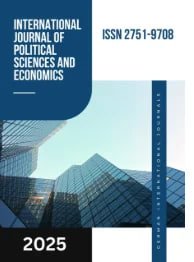FROM FINANCIAL AUDIT TO CLIMATE AUDIT: EXPANDING ACCOUNTABILITY MECHANISMS FOR UZBEKISTAN’S GREEN ECONOMY GROWTH
DOI:
https://doi.org/10.55640/Keywords:
Climate Audit Financial Accountability, Green Economy, Sustainable Finance, Green Bonds Uzbekistan, ESG Reporting Sustainable Development Goals (SDGs), Climate-Resilient Development, Environmental AuditingAbstract
Uzbekistan is moving through a strategic transition into a green economy; it is therefore essential to have the Green Economy Transition Strategy for 2019–2030 and climate resilience commitments under the Paris Agreement. This transition demands a lot of green investments in areas such as green bonds, renewable energy, and climate-smart agriculture. Yet, transparency and a genuine green image for the investments without falling to greenwashing remain huge hurdles for building investor confidence. Financial audits in Uzbekistan have traditionally focused on compliance with legal norms and the accountability of public money, but the somewhat novel domain of green finance calls for a new audit paradigm: climate audit. In order to ensure financial accountability, climate audit bridges the gap between conventional financial auditing techniques and international standards of Environmental, Social, and Governance (ESG) reporting, and helps in meeting the Sustainable Development Goals (SDGs). Based on the institutional setup of the country, this research analyzes existing lines of accountability, highlights gaps therein, and compares international best practices to propose a roadmap for introducing climate audit mechanisms into Uzbekistan's financial control system.
References
1. Climate Bonds Initiative. (2023). Green Bond Market Summary. Retrieved from https://www.climatebonds.net/resources/reports.
2.Government of Uzbekistan. (2019). Green Economy Strategy 2019–2030. Tashkent: Ministry of Economy and Finance.
3. International Capital Market Association. (2021). Green Bond Principles. Retrieved from https://www.icmagroup.org/greensocialandsustainabilitybonds/ 271
4.World Bank. (2022). Uzbekistan Climate Change and Development Report. Washington, DC: World Bank.
5.United Nations Development Programme Uzbekistan. (2023). Sustainable Development Goals Progress Report. Tashkent: UNDP Uzbekistan.
6.Asian Development Bank. (2023). Sustainable Finance in Central Asia. Manila: ADB.
7.Organization for Economic Cooperation and Development. (2020). Developing Sustainable Finance in Emerging Markets. Paris: OECD Publishing.
8.International Monetary Fund. (2022). Climate Finance and Green Bond Markets in Emerging Economies. Washington, DC: IMF.
9.Cabinet of Ministers of the Republic of Uzbekistan. (2025). Resolution on Climate Finance Mobilization. Tashkent: Government Gazette.
10.Ministry of Economy and Finance of the Republic of Uzbekistan. (2025). Sustainable Banking Framework Pilot Report. Tashkent: Ministry of Economy and Finance.
Downloads
Published
Issue
Section
License

This work is licensed under a Creative Commons Attribution 4.0 International License.
Authors retain the copyright of their manuscripts, and all Open Access articles are disseminated under the terms of the Creative Commons Attribution License 4.0 (CC-BY), which licenses unrestricted use, distribution, and reproduction in any medium, provided that the original work is appropriately cited. The use of general descriptive names, trade names, trademarks, and so forth in this publication, even if not specifically identified, does not imply that these names are not protected by the relevant laws and regulations.







